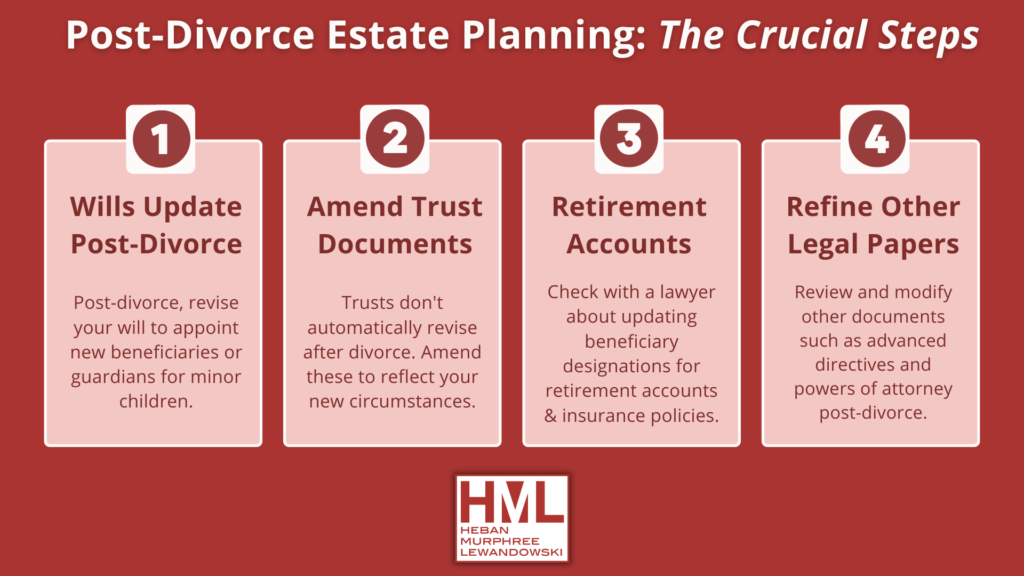- EXPERIENCED LAW FIRM IN TOLEDO, OH
- (419) 662-3100
How Divorce Shapes Your Estate Plan in Ohio

Protecting Your Digital Assets Through Effective Estate Planning
June 3, 2023
Navigating Estate Disputes in Ohio
July 20, 2023Divorce and Its Effect on Your Estate Plan
Divorce brings about a seismic shift in virtually all aspects of your life. Amidst heated disputes over assets, rights, and custodial issues, it’s easy to overlook the lasting impact of divorce on your estate plan. However, beyond the finalization of the divorce, it’s crucial to grasp how your estate plan will be affected and make necessary adjustments. Doing so not only guarantees the safeguarding of your loved ones after your death but also ensures that your wishes will be respected. Consider consulting the seasoned Ohio divorce attorneys at Heban, Murphree & Lewandowski, LLC for expert advice on estate plan adjustments post-divorce.
What Documents Require Revision?
Even though divorce initiates a few statutory changes, they’re typically insufficient to reshape your entire estate plan to reflect the new circumstances. Hence, a comprehensive review of all estate planning documents is recommended post-divorce.
- Wills – While a divorce decree nullifies your ex-spouse’s right to inherit assets upon your death, it’s generally still necessary to update your will. Ohio law stipulates that any assets left to an ex-spouse in your will are instead allocated to alternate beneficiaries or, if none, to the remaining estate. Furthermore, upon your death, your minor children’s surviving parent will usually be appointed as their legal guardian. If you have reservations about your ex-spouse in this role, updating your will to designate an alternate guardian is advisable.
- Trusts – Revocable trusts, popular as tools to manage assets, are not subject to the same automatic post-divorce revisions as wills. If you wish to remove your ex-spouse as a trustee or beneficiary, the trust documents must be amended. If your estate planning were a joint effort with your spouse, the trust would have been addressed during divorce proceedings. Collaborate with a legal professional to review your options for amending or terminating such trusts.
- Retirement Accounts and Insurance Policies – Retirement accounts like IRAs and 401K’s, pensions, and life insurance policies bypass the probate process and directly benefit designated beneficiaries upon death. Despite divorce, your ex-spouse’s designation as a beneficiary is not automatically revoked. According to Ohio law, the divorce decree must decide each spouse’s rights regarding life insurance policies. Consult a lawyer to verify if you can update beneficiary designations following the divorce.
- Other Estate Planning Documents – A comprehensive estate plan often includes additional documents like advanced directives, powers of attorney, deeds, and other legal documents outlining your wishes after your death. It’s important to note that divorce doesn’t automatically revise these instruments, so consult your attorney to ensure your estate plan mirrors your post-divorce circumstances.
Alimony: A Guide for Ohio Residents
Alimony, or spousal support, is a financial provision paid from one spouse to another during or after a divorce. The intention is to help the recipient maintain a lifestyle comparable to the one experienced during the marriage. It’s crucial to note that alimony isn’t automatically granted—the recipient must request it, or both parties must agree upon it.
How Are Alimony Payments Determined?
Alimony amounts can be ordered by the judge to be paid periodically for a specific duration or indefinitely until the recipient remarries.
However, the final amount is influenced by several factors, including:
- The age of each spouse
- The income and employment status of each spouse
- The division of assets in the divorce
- Individual living expenses
- The reasons leading to the marriage breakup
- The financial circumstances of both parties
- The length of the marriage
Tax Implications of Alimony
The tax implications for alimony payments differ depending on whether your divorce was finalized before or after December 31, 2018. For divorces finalized before this date, alimony payments are generally tax-deductible for the payer. However, alimony payments are typically not tax-deductible for those completed after; the recipient doesn’t have to report alimony as income.
IRS Requirements for Alimony
To be classified as alimony for tax purposes, payments must meet several IRS stipulated conditions:
- The paying spouse does not file a joint tax return with the recipient.
- Payments are made in cash, check, or money order.
- Payments are mandated by a divorce or separation agreement.
- The agreement doesn’t classify the payments as non-alimony.
- There’s no obligation to continue payments if the recipient passes away.
- The spouses do not live in the same household when the payments are made.
Alimony vs. Child Support
The key difference between alimony and child support lies in the intended purpose of the payments. Alimony is paid for the spouse’s benefit, while child support covers the children’s basic needs, such as food, clothing, housing, and medical care.
Contrary to alimony, child support isn’t considered taxable income for the recipient, and it isn’t tax-deductible for the provider since it’s meant to benefit the children, not the spouse.
Regarding tax implications, the parent with whom the child lives most of the year can generally claim the child as a dependent. However, the specifics of child support payments, including amount and duration, will be determined by the finalized custody agreement or court order by state law.
Leveraging Prenuptial Agreements in Estate Planning
In most states, laws exist to protect spouses from disinheritance, meaning you can’t simply write your spouse out of your will. Instead, if you’re seeking to maintain control over your estate, particularly if you’ve recently started a long-term relationship, consider a prenuptial agreement (or a postnuptial agreement, if already married). This formal agreement with your spouse helps you retain control over your assets, safeguarding them from state laws that would otherwise govern estate distribution upon death.
When is a Prenuptial Agreement Appropriate?
Prenuptial agreements may sometimes be viewed as controversial, but they are practical in several circumstances:
- Both partners were financially stable before marrying
- One partner has significant wealth or family assets
- The union is a remarriage, with or without children from previous marriages
- You wish to leave the majority of your estate or assets to children from an earlier marriage
- One partner has significant debt
- There is a substantial age difference between partners
Pros and Cons of Prenuptial Agreements
Prenuptial agreements come with their own set of advantages and disadvantages that need careful consideration before proceeding.
Pros of a Prenup:
- Allows greater control over your finances
- Establishes guidelines for financial distribution
- Ensures inheritance rights and family assets remain within the family
- Proves more powerful than a Will in some situations
- Eases some complications typically associated with divorce
- Protects personal and business assets
- Shields you from your spouse’s debts
Cons of a Prenup:
- You’re bound by a legal contract instead of specific state laws
- The agreement may be unequal
- Negotiating a prenup may cause awkwardness or discomfort
- Some people may perceive a prenuptial agreement as a sign of mistrust
Need Help?
We urge you to take control of your future and ensure that your estate plan accurately reflects your post-divorce circumstances. Taking action now will eliminate complications and uncertainties in the future. Don’t let the effects of divorce destabilize your estate plan; instead, harness this opportunity to reassess, revise, and reaffirm your intentions.
Act now, for peace of mind tomorrow. 419.662.3100









